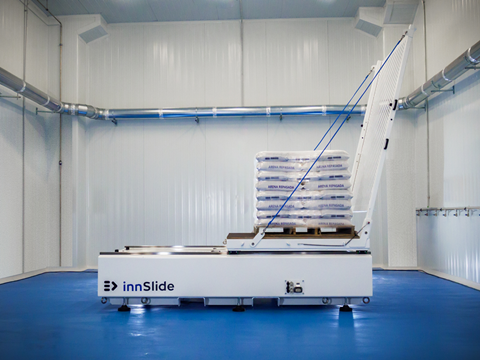
In the next of our interviews with the Sustainability Awards 2020 finalists, we talk with Safe Load Testing Technologies, whose Boomerang Horizontal Stability Tester is a patented solution for packaging optimization and CO2 reduction.
First of all, congratulations on being selected as a Sustainability Awards finalist! Could you please introduce your successful entry and what’s innovative about it?
Safe Load Testing Technologies has designed the Boomerang Horizontal Stability Tester, an advanced patented solution for packaging optimization and substantially reducing the CO2 emissions and increasing safety along the distribution cycle.
The most revolutionary features of the Boomerang Horizontal Stability Tester are its small dimensions that make it a transportable solution, and the innVision Pro, a leading and unique device in the market applied to transport simulation technologies that allows us to do a test in a few seconds and includes an artificial vision system that records and automatically analyzes the load deformation generating a report. The information obtained in this report is essential for companies to help them optimize their packaging and get them into the virtuous circle of 'Sustainability & Safety & Efficiency'.
What are the environmental challenges in packaging that your entry addresses, and what impact do you hope it will make?
Nowadays, stretch film is used commonly as tertiary packaging and there are two ways of contributing to sustainability. One way is recycling more and the second way is using less. Our innSlide Boomerang unit has been developed to help companies reduce the use of stretch film, in addition to optimizing primary and secondary packaging, and customers have achieved an average reduction of 25-30% in the use of stretch film as tertiary packaging. This benefit has resulted in an average reduction of 15-20% of CO2 emissions.
I’d like to ask you about the broader picture beyond your successful entry. ‘Sustainability’ in packaging is multi-dimensional – both in terms of objectives and challenges. Could you comment on the most important roadblocks you identify from your position in the value chain, and the kinds of solutions you would like to see addressing them (e.g. areas of technological innovation, collaboration, regulation)?
Our products bring companies a cost reduction benefit and additionally they are related to corporate social responsibility, but most of them have to take a definitive step towards sustainability in all areas. Actually, investments with this objective are still hard to get approved by companies´ boards.
At this moment, many companies are working very hard on innovative circular economy solutions like recycling systems, re-usable packaging materials or industry 4.0 technologies, and governments hopefully are going to push all business ecosystems to use them.










